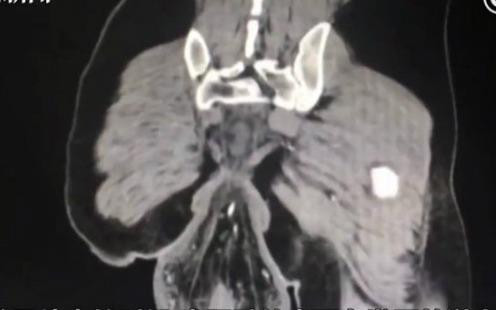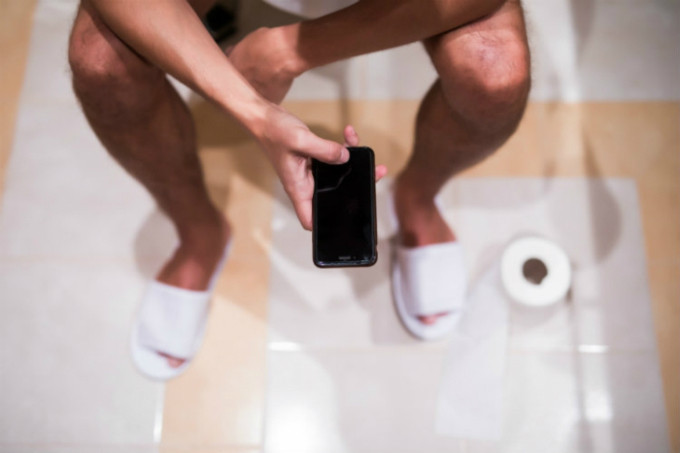Intestines fell out because of using phone for too long while going to toilet
That was the case of a man in China who injured his rectum after sitting on the toilet while using his smartphone, according to the country's media on February 9.
If you have a habit of using your phone, reading books, or stories while sitting on the toilet, read this story and the related health warnings. Because over time, this can cause swelling of the anus or even your intestines will fall out.
The man was rushed to the emergency room at Sun Yat-sen University Hospital in Zhongshan, Guangdong, about an hour after discovering a “ball” hanging from his anus. He was only able to move with the help of a friend.
At the hospital, doctors measured the man's 16cm "tail". They diagnosed him with rectal prolapse. The medical report also said that the cause was related to sitting on the toilet for too long using the phone.
|
CT scan shows a 'ball' protruding from the patient's anus. |
What is rectal prolapse? It is a condition where the rectum, or the last part of the colon, drops down and in the worst case scenario, the rectum can protrude through the anus and lie outside the anus. This is quite common, especially in children and the elderly.
Dr. Dan Su, one of the doctors at the hospital, said that most cases of rectal prolapse can be retracted, but the man in this story was an exception. Su said he had suffered from rectal prolapse since he was 4 years old, but had always been treated well before. This time, the patient had to undergo surgery to remove the protrusion. Two days later, he was able to walk.
A CT scan showed the size of the enlarged mass hanging outside the anus, as well as blood spots and bruising along the patient's intestinal wall. Dr. Su said it was possible that the man's pelvic muscles had weakened while trying to push the waste out, and that sitting on the toilet for too long had caused the condition.
Currently, the patient's health is recovering. Dr. Su warned anyone with hemorrhoids or rectal prolapse problems to seek treatment as soon as they discover the condition.
Rectal prolapse is common in children and the elderly.
According to the American Society of Colorectal and Trauma Surgeons (ASCRS), rectal prolapse occurs in 2.5 out of every 100,000 people. The subjects are elderly people over 50 years old, and women over 50 years old have a six times higher risk. However, men with this disease are usually in their 40s.
This condition does not occur suddenly but tends to manifest gradually, returning to normal after a period of time. When the rectum has not returned to its normal position, the patient with rectal prolapse may feel as if sitting on a "ball".
About 50% of patients have chronic constipation (a warning sign) and if left untreated, will require emergency surgery.
Your child (as in the case of the man mentioned who had rectal prolapse since age 4) may have this health problem between the ages of 1 and 5, when he started standing or potty training. The cause in these cases is often unknown.
|
Using the phone for too long while on the toilet increases the risk of rectal prolapse. |
Possible causes of rectal prolapse
- An infection in a person's intestines as a child can cause the rectum to swell and move down through the anus. Parasites or bacteria are the cause of the infection.
- Constipation is also a cause of rectal prolapse. The pressure from pushing can cause the rectum to bulge out.
- Diarrhea also causes swelling of the rectum, increasing the risk of prolapse.
- Chronic diseases such as cystic fibrosis (CF) or ulcerative colitis (UC) can cause malnutrition and constipation. UC can also cause diarrhea.
Signs and symptoms of rectal prolapse
If your child complains of any difficulty in defecating or cries or strains every time he or she goes to the toilet, look out for the following problems.
- Endometrial tissue appears in the anus after or during your child's bowel movements.
- Pain or discomfort during bowel movements
- Rectum is swollen, pink, or red
- Bleeding or mucus coming from your child's rectum. You may see this on your child's underwear, diaper, or cloth diaper.
Once you see any of the above signs, take your child to see a doctor.
Rectal prolapse test
Your doctor may ask you about your child's health first, so if your child has any unusual problems, be sure to tell them in detail. Your doctor or health professional may do the following tests:
- A test of the amount of chloride in your child's sweat. This test is used to check for cystic fibrosis (CF). If your child has CF, their sweat will contain high levels of chloride.
- An X-ray, ultrasound, or CT scan can show problems in your child's rectum in pictures. If your child has had an allergic reaction to oral solutions before the ultrasound, tell the medical staff.
Don't multitask while on the toilet.
There are many treatments for rectal prolapse depending on the cause and condition of the disease. This will be prescribed by doctors. However, what you can do to eliminate these health problems yourself is a scientific lifestyle.
The purpose of going to the toilet is to eliminate waste - that's all. Multitasking during this time increases the risk of rectal prolapse. Not only do you need to change this unhealthy habit yourself, but you also need to remind your child not to sit on the toilet for too long.





.jpg)
